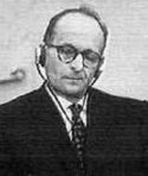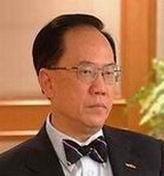 Adolf Eichmann (1906 íV 1962) |
 Donald Tsang (1944 - ) |
Adolf Eichmann
Adolf Eichmann (March 19, 1906 íV June 1, 1962) was a high-ranking Nazi and SS Obersturmbannfuhrer (Lieutenant Colonel). Due to his organizational talents and ideological reliability, he was tasked by Nazi Germany to facilitate and manage the logistics of mass deportation to ghettos and extermination camps in Nazi-occupied Eastern Europe. In 1960, he was captured by Israeli Mossad agents in Argentina and indicted by Israeli court on fifteen criminal charges, including charges of crimes against humanity and war crimes.
During the trial, many Holocaust survivors, testified against him and his role in transporting victims to the extermination camps. During the whole trial, Eichmann insisted that he was only "following orders" - the same defense used by some of the Nazi war criminals during the 1945-1946 Nuremberg Trials. He explicitly declared that he had abdicated his conscience in order to follow the Fuhrerprinzip (the German name for the leader principle, refers to a system with a hierarchy of leaders that resembles a military structure. This principle was applied to civil society at large in Nazi Germany).
Despite the attempt to use the Fuhrerprinzip as a means to evade responsibility for war crimes, Adolf Eichmann was convicted and hanged in 1962.
Eichmann analysis
Since Eichmann's death, historians have speculated on certain facts regarding his life. The most important question is how responsible Eichmann was for the implementation of the Holocaust. Most agree that Eichmann knew exactly what he was doing; however, some "Eichmann Defenders" (his son included) state that he was unfairly judged and that he was only doing his duty as a soldier. According to his own admission he joined the SS, not because he agreed or disagreed with its ethos, but because, like the careerist that he was, he simply needed an institution that would enable him to get on.
A third - and highly controversial - analysis came from political theorist Hannah Arendt, a Jew who fled Germany before Hitler's rise, and who reported on Eichmann's trial for The New Yorker magazine. In Eichmann in Jerusalem, a book formed by this reporting, Arendt concluded that, aside from a desire for improving his career, Eichmann showed no trace of anti-Semitism or psychological damage. She called him the embodiment of the "banality of evil," as he appeared at his trial to have an ordinary and common personality, displaying neither guilt nor hatred. She suggested that this most strikingly discredits the idea that the Nazi criminals were manifestly psychopathic and different from ordinary people.
Many concluded from this and similar observations that even the most ordinary of people can commit horrendous crimes if placed in the right situation, and given the correct incentives, but Arendt disagreed with this interpretation. Stanley Milgram suggested exactly that when he wrote "I must conclude that Arendt's
conception of the banality of evil comes closer to the truth than one might dare imagine." However, Arendt was not stating that Eichmann was normal and that any person placed in his situation would have done the same. Quite to the contrary, according to her account, Adolf Eichmann had abdicated his will to make moral choices, and thus his autonomy, which is the foundation of humanity and of living in society. Eichmann claimed he was just following orders, and that he was therefore respecting the duties of a "bureaucrat". But Arendt argued that he had essentially forsaken the conditions of morality, autonomy and the possibility to question orders. Eichmann had stopped thinking for himself, following as law all the Führer 's orders.
Donald Tsang
Donald Tsang is just an unscrupulous civil servant who was selected by his British master and later Chinese master to head the civil service of Hong Kong, not because he is a talented, outstanding sage, but because he is a tame, obedient slave. Unlike Adolf Eichmann who served his nation Germans, Donald Tsang served his colonial masters, i.e., Britons and Chinese, and betrayed his fellow Hong Kong people. During his chief executive election campaign in early 2007, Donald Tsang pledged to become a good chief executive by publicly saying, "I'll get the job done." Tsang's careerist remark parallels Eichmann's. What Donald Tsang wants is a job that enables his lavish living and gratify his vanity at the cost of Hong Kong democracy.